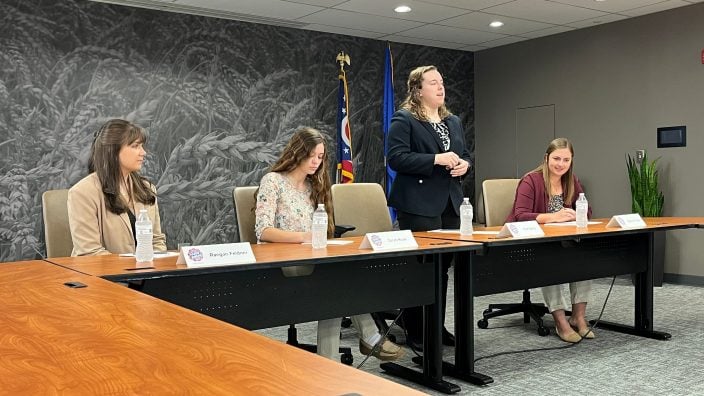Applications for Ohio Farm Bureau Health Plans now available
Members have three ways to apply: contacting a certified agent, calling 833-468-4280 or visiting ohiofarmbureauhealthplans.org.
Read MoreOhio has a new budget for fiscal years 2022-2023. The $74 billion budget includes education reform, statewide cuts to personal income taxes, and investments to help keep Ohioans employed and to create more job opportunities across the state. It also checks many other Ohio Farm Bureau priority issues boxes.
“From rural broadband and local meat processing capacity, to funding for H2Ohio, the Ohio Department of Agriculture and Ohio State, lawmakers and Governor DeWine heard from Ohio Farm Bureau and our members and responded to the issues laid out in our Ohio Agriculture and Rural Communities Action Plan with this new budget,” said Adam Sharp, executive vice president of Ohio Farm Bureau. “We appreciate the legislature and the administration for their recognition of the challenges facing Ohio’s farm and food sector and for the action to provide funding to address the concerns of their rural constituents across the state.”
One of the biggest line items in the new biennial budget is $250 million for the Ohio Rural Broadband Expansion grant program, created earlier this year by lawmakers to allow internet service providers to apply for grants that will help fund the infrastructure needed to provide faster internet access to underserved rural Ohio communities.
“This is the largest public investment in broadband we have ever seen in Ohio,” said Jenna Reese, Ohio Farm Bureau’s director of state policy. “Broadband access is essential in rural Ohio for many reasons. Farmers use it to market their products, to keep track of commodity prices and to utilize new precision technology. Rural Ohioans’ quality of life depends on technology, and their need for reliable internet access is critical.”
Gov. Mike DeWine’s H2Ohio initiative, a comprehensive, data-driven water quality plan to reduce harmful algal blooms, improve wastewater infrastructure and prevent lead contamination, received $170 million in the budget – $49.3 million of that will be used to expand the program to 10 additional counties in the Lake Erie Watershed.
The budget also created the Meat Processing Investment grant program and funded it at $10 million to help existing plants in Ohio expand their capacity and fund new construction, including guidelines for reviewing and approving the grants.
“This is specifically for small and medium-sized meat processors in Ohio to start up or expand their operation,” said Brandon Kern, senior director of state and national policy for Ohio Farm Bureau. “The goal is to increase meat and poultry processing capacity in Ohio to make our food system more resilient for farmers and consumers.”
DeWine signed the budget into law July 1.


Members have three ways to apply: contacting a certified agent, calling 833-468-4280 or visiting ohiofarmbureauhealthplans.org.
Read More

Collegiate Farm Bureau serves as a connection to current industry professionals and equips the next generation with the essential tools and resources needed to excel in their careers.
Read More

Ohio Farm Bureau members met one-on-one with state legislators and staff to discuss policy priorities impacting Ohio’s farms and rural communities.
Read More

Legacy nutrient deductions enable new farmland owners to claim deductions on the nutrients within the soil on which healthy crops depend.
Read More

Farmers, agribusinesses and community members are encouraged to nominate their local fire departments for Nationwide’s Nominate Your Fire Department Contest through April 30.
Read More

Introduced by Sen. Paula Hicks-Hudson, SB 120 would establish the Urban Farmer Youth Initiative Pilot Program.
Read More

Gases, vapors, and fumes can all create risk. How can we measure and protect ourselves from them?
Read More

The Ohio Farm Bureau’s Young Agricultural Professionals State Committee has named its 2026 leadership and the individuals who will be serving on the state committee for 2026-2028.
Read More

The Ohio Farm Bureau Foundation has multiple scholarships available to Ohio students from rural, suburban and urban communities who are pursuing degrees with a connection to the agricultural industry.
Read More

With 100% bonus depreciation now permanent, farmers can deduct the full cost of a new agricultural building in the year it’s placed in service.
Read More